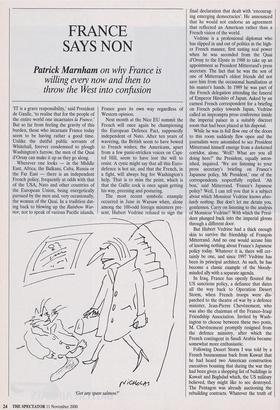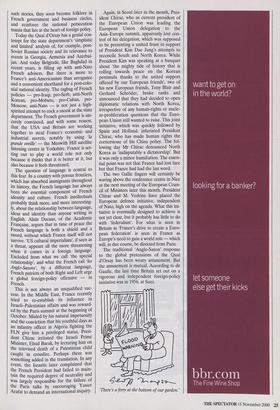FRANCE SAYS NON
willing every now and then to throw the West into confusion
`IT is a grave responsibility,' said President de Gaulle, 'to realise that for the people of the entire world one incarnates la France.' But so far from feeling the gravity of this burden, those who incarnate France today seem to be having rather a good time. Unlike the dutiful public servants of Whitehall, forever condemned to plough Washington's furrow, the men of the Quai d'Orsay can make it up as they go along.
Wherever one looks — in the Middle East, Africa, the Balkans, Cuba, Russia or the Far East — there is an independent French policy, frequently at odds with that of the USA, Nato and other countries of the European Union, being energetically pursued by the men and, very occasionally, the women of the Quai. In a tradition dat- ing back to blowing up the Rainbow War- rior, not to speak of various Pacific islands, France goes its own way regardless of Western opinion.
Next month at the Nice EU summit the French will once again be championing the European Defence Pact, supposedly independent of Nato. After ten years of wavering, the British seem to have bowed to French wishes; the Americans, apart from a few panic-stricken voices on Capi- tol Hill, seem to have lost the will to resist. A cynic might say that all this Euro- defence is hot air, and that the French, in a fight, will always beg for Washington's help. That is to miss the point, which is that the Gallic cock is once again getting his way, preening and posturing.
The most recent symbolic example occurred in June in Warsaw when, alone among the 100-odd foreign ministers pre- sent, Hubert Vedrine refused to sign the `Got any spare salmon?' final declaration that dealt with 'encourag- ing emerging democracies'. He announced that he would not endorse an agreement that reflected an American rather than a French vision of the world.
Vedrine is a professional diplomat who has slipped in and out of politics in the high- er French manner, first tasting real power when he was seconded from the Quai d'Orsay to the Elysee in 1988 to take up an appointment as President Mitterrand's press secretary. The fact that he was the son of one of Mitterrand's oldest friends did not save him from the occasional humiliation at his master's hands. In 1989 he was part of the French delegation attending the funeral of Emperor Hirohito of Japan. Asked by an earnest French correspondent for a briefing on French policy towards Japan, Vedrine called an impromptu press conference inside the imperial palace in a suitably discreet room that had been placed at his disposal.
While he was in full flow one of the doors to this room suddenly flew open and the journalists were astonished to see President Mitterrand himself emerge from a darkened corridor, alone. `Well? What are you all doing here?' the President, equally aston- ished, inquired. `We are listening to your press secretary's briefing on France's Japanese policy, Mr President,' one of the correspondents respectfully replied. `Ah bon,' said Mitterrand. 'France's Japanese policy? Well, I can tell you that is a subject about which Monsieur Vedrine knows abso- lutely nothing. But don't let me detain you, gentlemen. Carry on listening to the analysis of Monsieur Vedrine!' With which the Presi- dent plunged back into the imperial gloom through a different door.
But Hubert Vedrine had a thick enough skin to survive the friendship of Francois Mitterrand. And no one would accuse him of knowing nothing about France's Japanese policy today. Whatever it is, there will cer- tainly be one, and since 1997 Vedrine has been its principal architect. As such, he has become a classic example of the bloody- minded ally with a separate agenda.
In Iraq, France has openly flouted the US sanctions policy, a defiance that dates all the way back to Operation Desert Storm, when French troops were dis- patched to the theatre of war by a defence minister, Jean-Pierre Chevenement, who was also the chairman of the Franco–Iraqi Friendship Association. Invited by Wash- ington to choose between these two posts, M. Chevenement promptly resigned from the defence ministry, after which the French contingent in Saudi Arabia became somewhat more enthusiastic.
Following Desert Storm I was told by a French businessman back from Kuwait that he had heard two American construction executives boasting that during the war they had been given a shopping list of buildings in Kuwait and Baghdad which, the US military believed, they might like to see destroyed. The Pentagon was already auctioning the rebuilding contracts. Whatever the truth of such stories, they soon become folklore in French government and business circles, and reinforce the national persecution mania that lies at the heart of foreign policy.
Today the Quai d'Orsay has a genial con- tempt for the state department's 'simplistic and limited' analysis of, for example, post- Soviet Russian society and its relevance to events in Georgia, Armenia and Azerbai- jan. And today Belgrade, like Baghdad in recent years, is filling up with anti-Nato French advisers. But there is more to France's anti-Americanism than arrogance and a convenient shorthand for a post-colo- nial national identity. The ragbag of French policies — pro-Iraqi, pro-Serb, anti-North Korean, pro-Mobutu, pro-Cuban, pro- Moscow, anti-Nato — is not just a high- spirited attempt to cock a snook at the state department. The French government is sin- cerely convinced, and with some reason, that the USA and Britain are working together to steal France's economic and industrial secrets, notably by using `la grande oreille' — the Menwith Hill satellite listening centre in Yorkshire. France is set- ting out to play a world role not only because it thinks that it is better at it, but also because it feels threatened.
The question of language is central to this fear. In a country with porous frontiers, which has absorbed immigrants throughout its history, the French language has always been the essential component of French identity and culture. French intellectuals probably think more, and more interesting- ly, about the relationship between language, ideas and identity than anyone writing in English. Alain Decaux, of the Academie Francaise, argues that in time of peace the French language is both a shield and a sword, without which France itself will not survive. 'US cultural imperialism', if seen as a threat, appears all the more threatening when it comes in a foreign language. Excluded from what we call 'the special relationship', and what the French call 'les Anglo-Saxons', by a different language, French patriots of both Right and Left urge a global foreign-policy offensive — in French.
This is not always an unqualified suc- cess. In the Middle East, France recently tried to re-establish its influence in. Israeli–Palestinian affairs and was reward- ed by the Paris summit at the beginning of October. Misled by his natural impetuosity and the conviction that his youthful days as an infantry officer in Algeria fighting the FLN give him a privileged status, Presi- dent Chirac irritated the Israeli Prime Minister, Ehud Barak, by lecturing him on the televised death of a Palestinian child caught in crossfire. Perhaps there was something added in the translation. In any event, the Israelis later complained that the French President had failed to main- tain the required degree of neutrality and was largely responsible for the failure of the Paris talks by encouraging Yasser Arafat to demand an international inquiry. Again, in Seoul later in the month, Pres- ident Chirac, who as current president of the European Union was leading the European Union delegation to the Asia–Europe summit, apparently lost con- trol of his delegation, which was supposed to be presenting a united front in support of President Kim Dae Jung's attempts to reconcile South and North Korea. While President Kim was speaking at a banquet about 'the mighty tide of history that is rolling towards peace on the Korean peninsula thanks to the united support offered by our European friends', two of his new European friends, Tony Blair and Gerhard Schroder, broke ranks and announced that they had decided to open diplomatic relations with North Korea, irrespective of any human-rights or nucle- ar-proliferation questions that the Euro- pean Union still wanted to raise. This joint initiative, which was quickly followed by Spain and Holland, infuriated President Chirac, who has made human rights the cornerstone of his China policy. The fol- lowing day Mr Chirac denounced North Korea as 'indisputably a dictatorship'. But it was only a minor humiliation. The essen- tial point was not that France had lost face but that France had had the last word.
The two Gallic fingers will certainly be waving above the conference centre in Nice at the next meeting of the European Coun- cil of Ministers later this month. President Chirac and M. Vedrine have placed the European defence initiative, independent of Nato, high on the agenda. What this ini- tiative is eventually designed to achieve is not yet clear, but it probably has little to do with 'federalism'. For what is seen in Britain as 'France's drive to create a Euro- pean federation' is seen in France as Europe's need to gain a world role which will, in due course, be directed from Paris.
The traditional 'Anglo-Saxon' response to the global pretensions of the Quai d'Orsay has been weary amusement. But the amusement is mutual. According to de Gaulle, the last time Britain set out on a vigorous and independent foreign-policy initiative was in 1956, at Suez.
`There's a ferry at the bottom of our garden.'



























































































 Previous page
Previous page